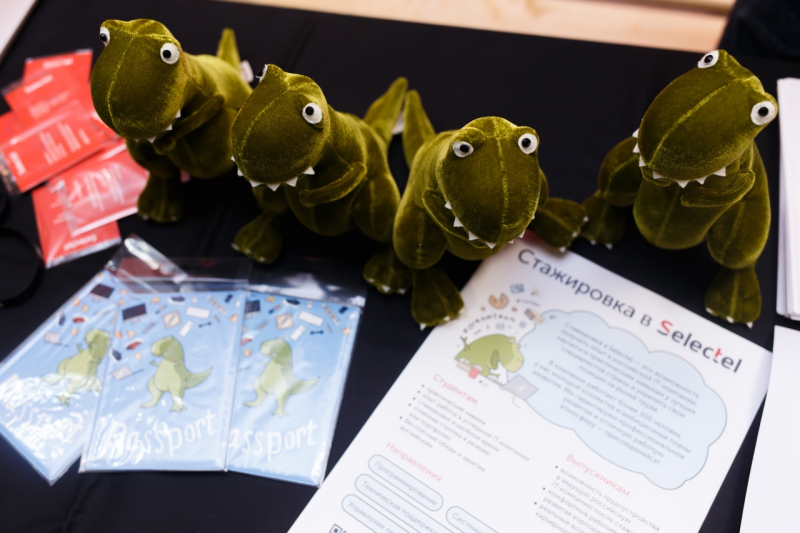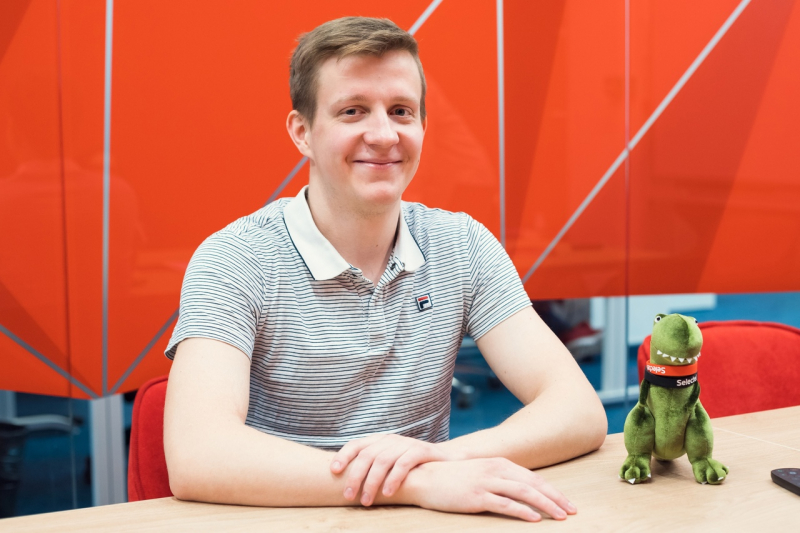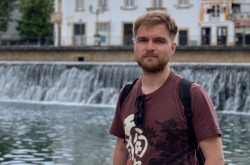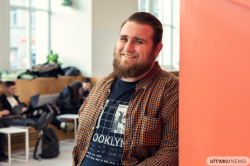“The university taught me to think for myself”
How and why did you enroll at ITMO University?
I came here from Yekaterinburg in 2014 to apply for Bachelor’s studies. I considered many universities: Peter the Great St. Petersburg Polytechnic University, St. Petersburg State Institute of Technology, ITMO University, and several others, I don’t even remember all of them now. ITMO became a strong favorite – I liked the subject areas and I liked the people. I even liked the way they talked to me at the admissions office and described the university. It was clear that they were interested in me. So I made it my first choice, which meant leaving my original documents there.
They contacted me in a little while, said that I was admitted, and congratulated me. So I ended up at the Faculty of Infocommunication Technologies in the field of network and cloud technologies.
Why this field in particular?
To tell the truth, there was no particular field I wanted to study. Like many applicants, I didn't know what exactly I wanted. When I began to explore possible subject areas, I felt like I opened a new book.
I knew that I like informatics and computer networks but I also knew that I didn’t want to be a programmer. I was more interested in hardware, in messing around with operating systems, and network devices. So I chose this program and haven’t regretted this decision.
What did you like at ITMO most?
The first two courses were filled with classes in physics and mathematics. By the way, the latter is delivered at a high level at ITMO, and it wasn’t easy for me. I had a wonderful teacher at school, but the university had a completely different educational pace.
During the first years of study, there weren’t many specialized subjects, although we were looking forward to them. Not all of them were perfect, but there were very cool courses on PC organization and network hierarchy. At the same time, I’d lost all desire to learn how to code (laughs). The programming courses were aimed at people who had some experience with it in school. I had no such experience, so it took me a lot of time to even understand what was happening in general. Of course, my classmates helped a lot. We had a very friendly class and remain friends to this day.
I also liked some of the very talented lecturers who had a strong desire to help you, to teach you. If they saw your interest, they were ready to assist you, stay after hours, and explain something additionally. It’s really great.

How well were you prepared for a real job after studying at ITMO?
That’s a very good question! The core subjects were taught at a fairly good level: there were many tests and oral examinations. The knowledge I acquired came in handy when I tried to join the Selectel company where I now work. Although many other things I had to learn on the spot.
The university taught me something else: the ability to understand, think for myself, and solve tasks. It taught me to think outside the box, not as a school student, but as an independent young specialist. Most of all, I am grateful to ITMO as I was able to join the Selectel team in my third year of study.
How did this happen?
I remember it very well, it happened in February 2017. Six months earlier, we were given a list of companies where we can enter a month-long internship. I looked through them all, but only liked Selectel, a large provider of IT infrastructure, one of the market leaders in Russia.
When I went there, I saw for the first time what an independent private company that takes care of its employees looked like. For me it was a revelation, I didn’t know that it’s possible. There was a nice office, comfortable workplaces, free coffee, table tennis, and friendly communication. Everyone was nice to you and ready to help. Back then, I was very impressed.
Selectel employees gave us lectures and showed us how everything works. Later, I talked with the guys who had internships in other companies, and most of them were amazed by our experience, by the fact that we worked in server rooms, organized cable communication lines, set up and performed inventory procedures with real equipment, and made calculations. We were able to see how everything really works.
So you decided that you would like to stay?
Something like that! I met a wonderful person at the company, Vladimir Sitkov. He became a “second dad” for me at Selectel. He always helped us during the internship and gave lectures on fiber optics.
When I completed my third year of studies, I messaged him telling him I would like to work there. He said, “No problem, come!” In several weeks, I was an intern at their fiber-optics communication lines department.

“It’s an unpredictable job – you never know what awaits you tomorrow”
You started to work after your third year of studies. Was it hard for you to complete your Bachelor’s degree and then a Master’s degree?
Sometimes it was hard to study and work at the same time. For example, I had to visit the university’s military department after night shifts. But I wasn’t a bad student nevertheless, I had been receiving the regular student stipend.
I used to compare myself with my roommates. Back then, they didn’t really care about their future, but I wanted to start a career, find a place somewhere, become a valuable specialist, and gain new knowledge.
Was there something about your study that helped you stay at the company and grow as a specialist?
Sometimes the diploma helped me. Also, studying taught me how to process large amounts of information, look for the data you need, even google in an efficient way – it’s also important.
What was your career path in Selectel like?
For the first year and a half, I worked at the department of fiber-optics communication lines – it was transformed into the department of infrastructure later. I was engaged in optics, network design, and worked on AutoCAD. By the way, at university, I was taught very well how to use it! Special thanks to Anton Suprun, his AutoCAD classes were great, I often thought about them.
At some point, it became clear that I didn’t have enough experience to further develop in this department. The manager suggested that I could acquire additional competencies in another department. At that time, I didn’t have enough skills to improve my position, but I had to somehow move up the career ladder to avoid getting “stuck.”
So I occupied the position of a junior data center engineer: I worked with customer requests, set up hardware, diagnosed dysfunctional platforms and components, and organized the communication at the physical and logical levels. I did a lot of things. A while later, I received the third category of electrical safety access and became a systems engineer at the St. Petersburg data center. I worked at several Selectel data centers and improved my position to a systems engineer.

What are your current responsibilities?
In addition to the duties of a systems engineer, I have recently started to work on client projects and VIP customers. I organize everything they need: from preparing new spaces for expansion to operating the equipment.
Selectel has a network of data centers: our own sites, where we have server rooms, provide them with an uninterrupted power supply and cooling, connect new server cabinets, and maintain the infrastructure’s functions. Selectel helps clients to stop using their own server rooms located somewhere in the basement and switch to our infrastructure, physical or cloud. We, systems engineers, have the task of organizing such infrastructure for all kinds of projects.
There is a lot of work, and it varies a lot because each client has their own infrastructure, which is often hybrid and complex. It happens that by the time all the equipment is set up and tested, additional notes from the client appear and we must take them into account. If something doesn’t come into place and there are errors or failures of disks, we must figure it out and find the cause of the problem, in software or hardware.
Sometimes a client company scales up and we need to prepare new desks and servers for them. It’s a lot of inventory work – it’s important to check that everything is properly detected by our internal systems and maintain the informational order.
I also train young Selectel specialists. We have a system of corporate courses. Interns take tests to become junior team members. Then, I personally interview them, tell them about our work, and answer their questions.
Nowadays, we often hear how great it is to be a programmer – your code allows robots to walk, rockets to fly, banks to process financial operations, and VR specialists to create fantastic virtual landscapes. What do you like about working as a systems engineer?
First of all, this job allows you to work not only intellectually, but also manually. Secondly, I like how unpredictable it can be: you never know what awaits you tomorrow. Programmers typically sit at their tables, but I work anywhere but there. Sometimes I am at the desk and sometimes climbing under something. You never know where the next task will take you. That’s what attracts me – the lack of a monotonous routine.
It so happens that in the midst of the working day, you have client tasks, several interns who need your attention, and at the same time, some equipment has arrived at the office and you must take it in. And then there could be an accident: something stopped working and you urgently need to find out where the problem lies and how to solve it. In such cases, you learn to prioritize and complete tasks cool-headed. Such stressful days really make you stronger.
I also enjoy the problem-solving process, when you struggle with a task, look for the error, try to figure it out, and finally, you make it. It’s a very pleasant feeling to help another person.
Overall, you need to be flexible, act according to the situation, talk to clients, engineers, developers, and be mobile. If you like to sit calmly without being bothered – this isn’t a job for you. But if you like to face new challenges every day and learn, you’ll fit right in.

“You should know how to ask the right questions”
In 2017, you weren’t the only ITMO intern at Selectel. How many of you were there and how many have stayed at the company?
There were seven of us and three still work at the company. But I was the only one who asked to join them right after the internship. Other people also liked it there, but they joined our team later.
You started to work after your third year of study. Now you select applicants and interns yourself. How should a student present themselves in order to be admitted?
Yes, we have a lot of young specialists, many of them are from ITMO. I can see how excited they are, they want to study without textbooks by seeing how everything works and become a part of it.
It’s important to show your desire to work and grow. You should be proactive and realize that by suggesting something, you should be responsible for its implementation.
At the same time, you shouldn’t be afraid to ask if you don’t understand something. You should know how to ask the right questions without overdoing it. At first, try to figure it out yourself, and only then ask a colleague – of course, they will help you.
What advice would you give to someone who wants to become a systems engineer? What skills should they work on? What knowledge to gain? Should they focus on studying or look for other ways to grow?
If you apply for such a job at Selectel, you would need to understand how modern telecommunication systems and data transmission networks work. Simply put, you need to understand how the internet works, at least at a basic level. It might also be useful to know how to work on Linux OS and have basic skills in administration.
So a university-level knowledge would suffice?
Yes, quite so. If you are a good student, it shouldn’t be too difficult. Especially if you study at a university like ITMO.
In May, your company will host career days as an opportunity to learn more about your work. Could you talk about it in more detail?
Yes, Selectel Career Days is an annual event to which we invite students from various universities. You can come to our office, see a real server, and check out how it’s being assembled and set up, and how data is transmitted. You can also talk to specialists and gain experience that can’t be gained at a university.
I visited such events as a student, and then later as a Selectel employee, including career days hosted by ITMO at the Lomonosov campus.
Such events are a great opportunity for everyone who would like to engage in cloud technologies, telecommunications, and IT marketing. You don’t have to have a desire to join our company in particular, you can just check out how the industry functions.

You said that you took part in career days hosted by ITMO University. Why does Selectel cooperate with the university?
There are several reasons. For one, ITMO is a great university. Its graduates are valuable in the job market. Moreover, it has a good reputation, works with the media, industrial partners, and companies; which allows them become more well-known. That’s why we cooperate so well together.





